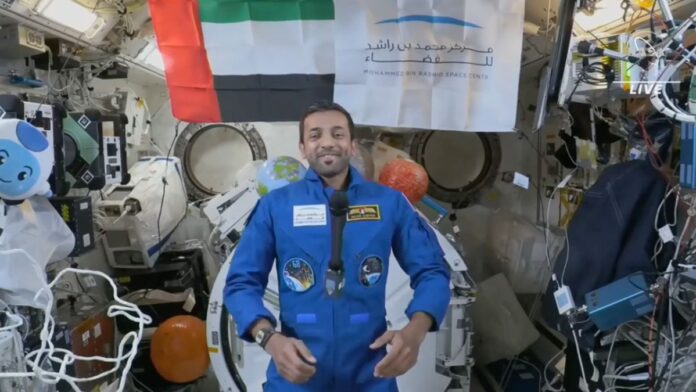The first Emirati astronaut to spend months in space says his excursion will prepare for future moon exploration.
Sultan Al Neyadi spoke briefly from the International Space Station (ISS) on Monday (March 7) about how things are going as he gets adjusted to microgravity, after he blasted off last Thursday (March 2) aboard the SpaceX Crew-6 mission. Moon missions were among the exploration priorities Al Neyadi highlighted.
“People will go to the moon and Mars,” Al Neyadi said, speaking for 10 minutes in a space-to-ground call with United Arab Emirates (UAE) vice-president His Highness Sheikh Mohammed Bin Rashid Al Maktoum.
Saying in Arabic that it’s important to learn about microgravity in Earth orbit, Al Neyadi added a large ISS goal is to practice countermeasures to mitigate the negative health effects of extended stay in space (like exercise) to help future lunar explorers. (Live interpretation in English was provided on NASA Television, which carried the event from the ISS.)
Related: SpaceX Crew-6 astronaut mission: Live updates
(opens in new tab)
Al Neyadi’s trip, which should last about half a year, is the second-ever journey by an Emirati astronaut. His colleague Hazzaa Ali Almansoori spent eight days in space in 2019 on a short Russian Soyuz spacecraft excursion; Al Neyadi received his own orbital trip through an agreement with Houston-based Axiom Space, which ferries commercial astronauts to orbit.
The UAE is a signatory of the NASA-led Artemis Accords that aims to put boots on the moon as soon as 2025, with the Artemis 3 landing mission. While the UAE has not announced any lunar astronauts yet, its Rashid rover will touch down on the moon in April aboard the Japanese ispace lander.
Al Neyadi said his half-year excursion will pass quickly, given he has a “crowded schedule” assisting his colleagues with completing hundreds of experiments. Some of the science is coming from the UAE, he added, without providing specifics.
The Emirati astronaut will have 19 dedicated experiments on topics including cardiovascular health, back pain, the immune system, plant biology, material science, sleep, radiation and fluids, according to materials (opens in new tab) provided by the Mohammad Bin Rashid Space Centre that manages the UAE astronaut program.
In an outreach effort, the space center’s University of Medicine and Health Sciences also has two experiments done with UAE students on the ground. One experiment examines dental or oral cells in space, versus Earth, while the other looks at “cardio-postural interactions” (referring to how blood flows in different body positions, which is greatly affected by microgravity.)
Al Neyadi added during the orbital event that he is still adjusting to floating around in space, but enjoying the process. “I’m still coping, I’m still learning, but hopefully I will enhance my skills in the coming days.”
Elizabeth Howell is the co-author of “Why Am I Taller (opens in new tab)?” (ECW Press, 2022; with Canadian astronaut Dave Williams), a book about space medicine. Follow her on Twitter @howellspace (opens in new tab). Follow us on Twitter @Spacedotcom (opens in new tab) or Facebook (opens in new tab).

